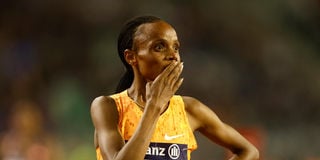Premium
Best time to start 2028 Olympic preparations was 10 years ago

Beatrice Chebet of Kenya celebrates after winning the Women's 5000m final.
What you need to know:
- However, the fact that 32 federations came together to discuss the future is a big break with the past. It is also very transformational and portends a better future in sports long-term planning.
- New thinking and new way of doing things will certainly give us different results. Hopefully and purposely for the better.
Everything held constant, Kenya is going to participate in the 2032 Brisbane Olympic Games..
The International Olympic Committee will soon announce the host city of the 2036 Olympics. Egypt and India are said to be in the running to host. We therefore have countries in full execution mode of hosting the biggest sporting event in the world.
Who is going to be in Team Kenya in 2028, 2032, 2036, or even 2040!
The years seem far away , however, assuming the average age of a Team Kenya member is 26 years, our Olympians for 2040 are 10 years now. Where are they, and what are they doing in preparation.
Looking at the more technically demanding sports, we should be talking about the 5 year olds now. If they are not already on the pathway, then around September 2040 conversations will still be how much better the team could have done.
Thoughts around the 2040 Olympics bring us back to the next major Olympics assignment. I hope by now anyone reading this gets a sense of urgency and joins me in asking the big question; if the athletes are not in active training and preparation now, when will they start and how will they catch up with the rest of the world?
Top sporting countries are in the execution phase of the 2028 and 2032 Olympics. They are on the planning stage of the 2036 and 2040 Olympics.
It is against this background that all the federations with sports codes in the Olympics convened under the National Olympic Committee early this week to start conversations around early and strategic preparations.
The immediate lessons of Paris 2024 were shared by both the participating federations and those who didn’t qualify.
Areas of focus were identified and priority lists developed. The ever-present challenge of funding was put aside so that clear focus can be attained on the fundamental aspects that need to be addressed.
At the end of the first workshop, all federations were given two months to work on the specific plans. These will revolve around athletes, coaches, infrastructure, education, events, competitions, and funding, among many other areas of strategic focus. Every federation will have a very specific and individualized programme.
Some will take up this challenge and others will put it aside to deal with other “urgent” matters. Like the biblical parable of the sower, some of the plans will be put into a fertile environment and thrive, while others will fall into a rocky (pun intended) environment and dry up.
However, the fact that 32 federations came together to discuss the future is a big break with the past. It is also very transformational and portends a better future in sports long-term planning. New thinking and new way of doing things will certainly give us different results. Hopefully and purposely for the better.
We have a very busy international schedule in the next four years. Athletes window close by the day. It is therefore important to make use of every opportunity.
The best time to start preparations was 10 years ago. The next best time is now!
Mutuku is Secretary General of NOC-K. [email protected]





